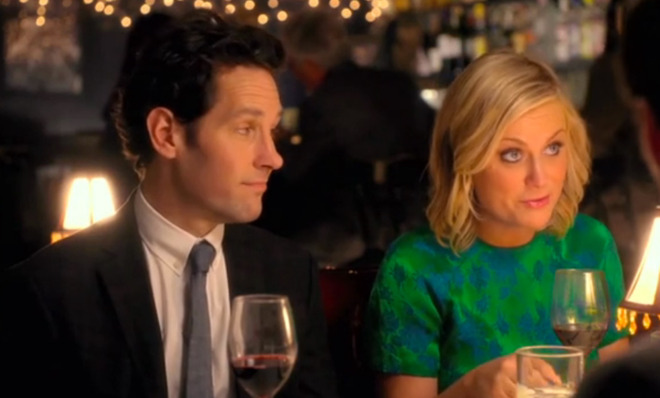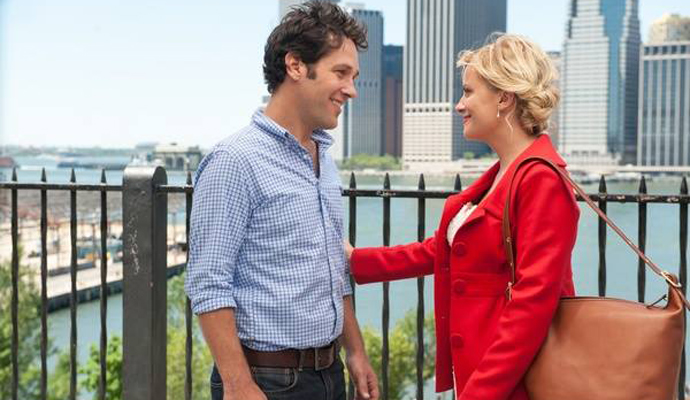Girls on Film: How They Came Together saved the romantic comedy by blowing it up
David Wain's satire of the romantic comedy shows just how far charm can get you


A free daily email with the biggest news stories of the day – and the best features from TheWeek.com
You are now subscribed
Your newsletter sign-up was successful
Michael Showalter and David Wain's satire has all the subtlety of a begging dog drooling over your dinner plate. In general, their brand of irony is not the kind that leads to misconceptions. It's a celebration of extreme farce — where excursions into town during summer camp become time-defying drug-fueled binges, as in their first feature, Wet Hot American Summer.
Their latest absurd collaboration, They Came Together, applies their skewed sensibilities to the romantic comedy genre — but it doesn't feel quite so bizarre. As absurd as their film is, it also demonstrates why romantic comedies worked in the first place.
Amy Poehler and Paul Rudd star as Molly and Joel — two strangers in the big city whose lives are destined to intertwine. After Joel suffers a messy breakup, their mutual friends scheme to set them up. The two meet, they argue with ferocity, and then they notice their attraction to one another. It would be perfect — if only they weren't enemies about to go to war. She's the sweet, independent candy shop owner; he's the well-meaning guy who works for the big candy corporation vying to bring her business down.
The Week
Escape your echo chamber. Get the facts behind the news, plus analysis from multiple perspectives.

Sign up for The Week's Free Newsletters
From our morning news briefing to a weekly Good News Newsletter, get the best of The Week delivered directly to your inbox.
From our morning news briefing to a weekly Good News Newsletter, get the best of The Week delivered directly to your inbox.
Their New York-ness is so deliberately overblown that they could give Woody Allen a run for his money. They rave about Zabar's, shop at The Strand, and discuss The New York Times. Molly runs a twee candy shop that is financially inept enough to give candy away for free. Joel is a clueless corporate drone who misses the towering pile of evidence that his girlfriend (Cobie Smulders) is cheating on him. When they finally meet, Molly and Joel have passionately superficial conversations, falling in love in a whirlwind of clichés.
But because this is Showalter and Wain's world, every satirical element and cliché is exaggerated to the nth degree. Molly and Joel were meant to be together because, astonishingly, they both love "fiction books." They frolic through New York and play in a pile of leaves next to a decomposing corpse. When Molly wants to test how watchful her boyfriends are, she puts on a pair of Groucho glasses. Joel pulls hamburgers from behind people's ears, and when Molly puts on a fashion show for her friend to find the perfect outfit, she settles on medieval armor.
Similarly, the farce of They Came Together is fueled by the ample gender clichés of the rom-com. Molly and Joel are just as shackled to their genders as they are to the idealism of Hollywood love stories. The men in the film boast layers of goofiness, but they also have direction and insight, dominating the narrative and leading the ruminations on romance. The women are charming, but they tend to scheme and manipulate, seduce and gossip; they are lovelorn singles, seductive cougars, and snarky shrews. While Joel delights in a large group of diverse friends, Molly's only support seems to be her employee, her sister, and the casual friends she shares with Joel.
Every moment of overt ridiculousness forces us to face the imbalance between Molly and Joel, accentuating the narrow confines of the characters. The dichotomy of the Hollywood romance is under attack just as much as clichés like the "coincidence" of loving fiction books.
A free daily email with the biggest news stories of the day – and the best features from TheWeek.com
For all its irony about the genre, though, They Came Together isn't free of the romantic comedy's shackles. Rampant skewering isn't enough to keep the film from being charming, or from embracing a little nonsensical romanticism. This, however, isn't a failure of Showalter and Wain — it's a testament to the ongoing insidiousness of the rom-com.

The genre exists because of Hollywood's early realization that charisma and chemistry could trump all else. Many trite romantic comedies were successful merely because of their leads. The repetitive structure of the rom-com breeds familiarity and comfort, and the right actors can make the roteness feel fresh.
The casting for They Came Together is part of the irony. The film isn't just led by two popular comedians; Showalter and Wain cast two of the most likeable talents in the business. Poehler and Rudd's mix of charisma and chemistry trumps the film's ridiculousness and reveal just how far likability can stretch. There is no reason for Molly and Joel to be together, but Poehler and Rudd are engaging enough that we still want it to happen. In that way, They Came Together meshes with the films it mocks.
They Came Together makes the audience mock rom-coms — but, through its charm, it eventually wins them over to the genre. By the time the killer cameo arrives at the end, the audience is caught in the routine. We're ready to buy the utterly random appearances and embrace the excitement of the big, yet inevitable, twists. (In a screening for critics, which is usually subdued, what should have been an obvious finale invoked uproarious, floor-pounding laughter.)
In the end, the audience isn't allowed to feel superior to the characters, no matter how ridiculous, stupid, or nonsensical they are. This is the beauty, and supreme charm of They Came Together. It is many things at once: a cathartic release of the aggravation that now follows romantic comedies, a celebration of Hollywood charm, a satire of form that also satirically manipulates the audience, and most importantly, a potential roadmap for the future.
By revealing that charm is so powerful that it can even make a satire of romance feel romantic, They Came Together proves that Hollywood doesn't have to fear how stretching the boundaries might affect the box office. If charismatic casting can make mockery romantic, it can certainly handle a broader base of storytelling.
In the end, it isn't familiarity that matters. It's charm.
Girls on Film is a weekly column focusing on women and cinema. It can be found at TheWeek.com every Friday morning. And be sure to follow the Girls on Film Twitter feed for additional femme-con.
Monika Bartyzel is a freelance writer and creator of Girls on Film, a weekly look at femme-centric film news and concerns, now appearing at TheWeek.com. Her work has been published on sites including The Atlantic, Movies.com, Moviefone, Collider, and the now-defunct Cinematical, where she was a lead writer and assignment editor.



